Module 1 Wonders of the world Unit 3 Language in use课件(共22张PPT)
文档属性
| 名称 | Module 1 Wonders of the world Unit 3 Language in use课件(共22张PPT) | 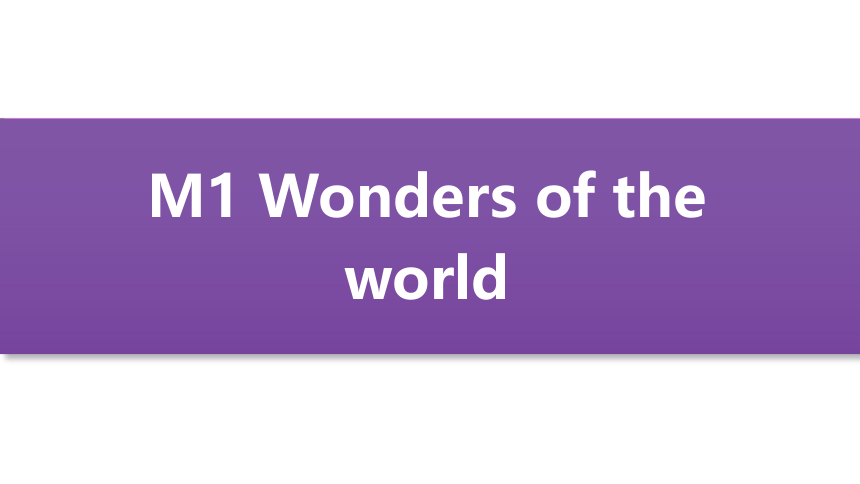 | |
| 格式 | zip | ||
| 文件大小 | 139.2KB | ||
| 资源类型 | 教案 | ||
| 版本资源 | 外研版 | ||
| 科目 | 英语 | ||
| 更新时间 | 2022-06-05 14:29:04 | ||
图片预览

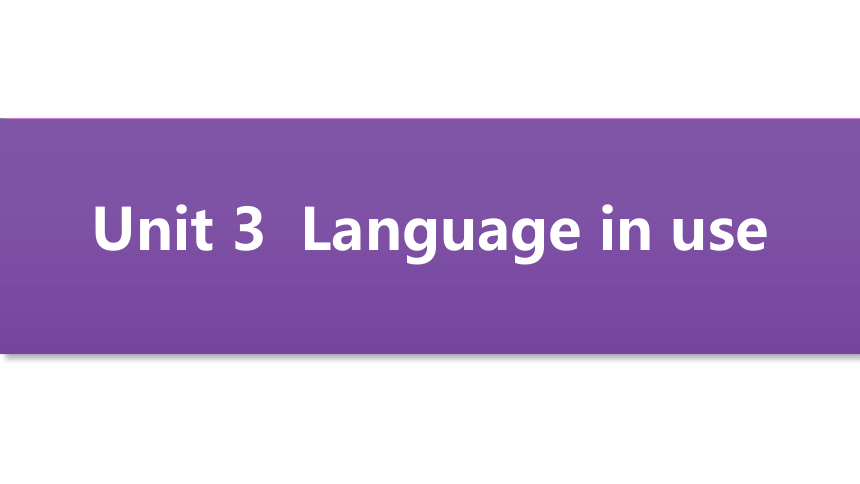
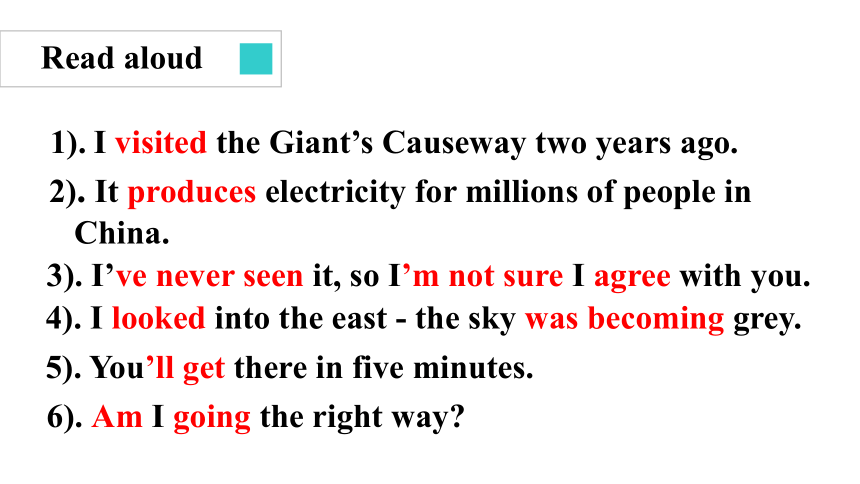
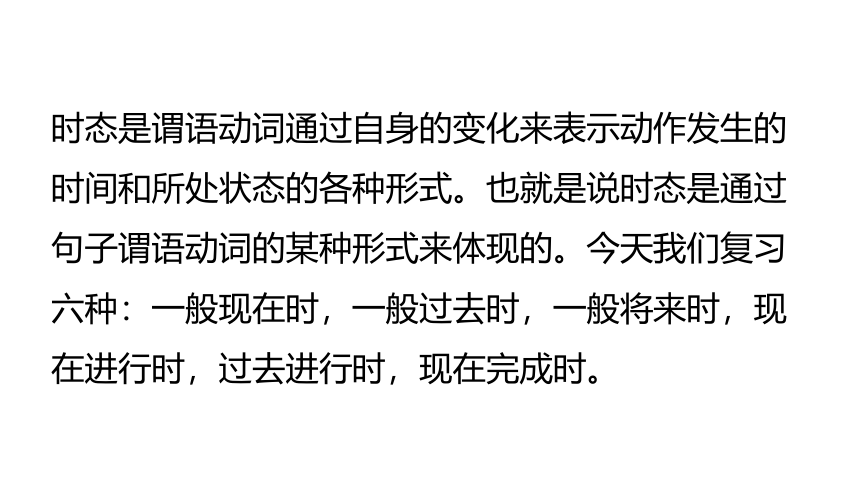
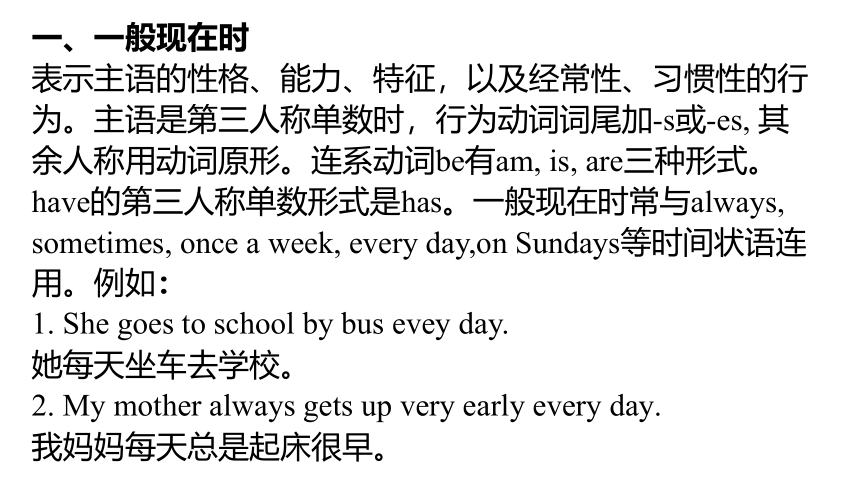
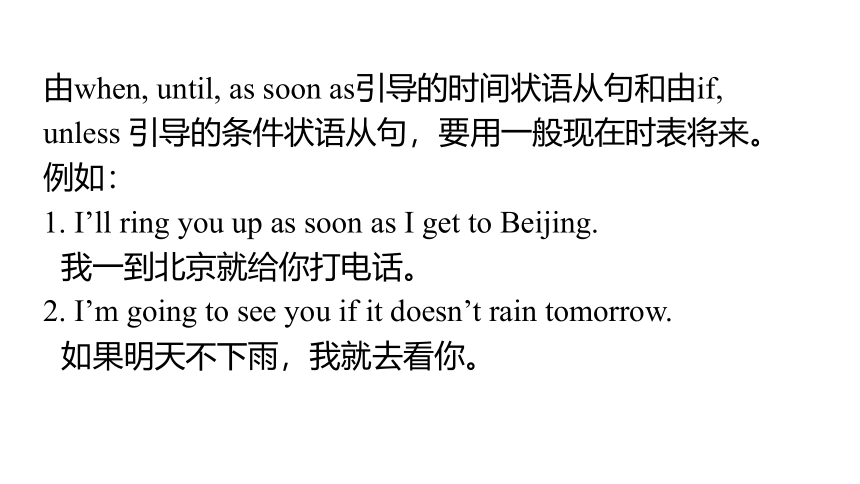
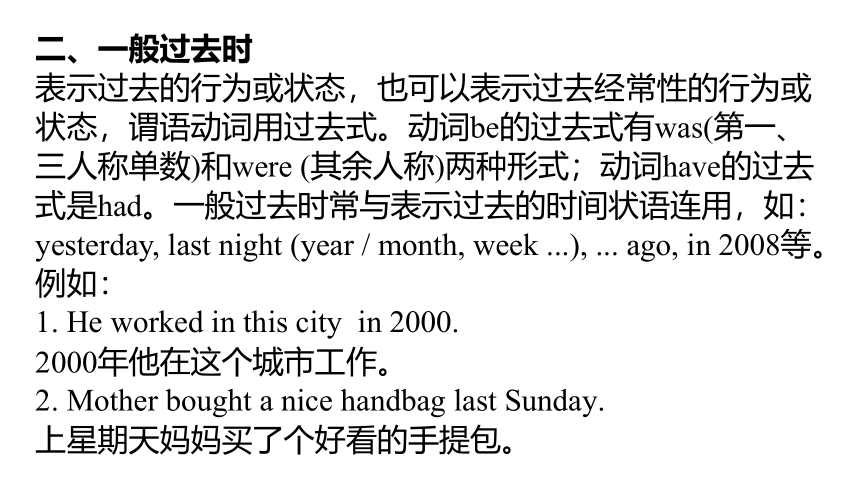
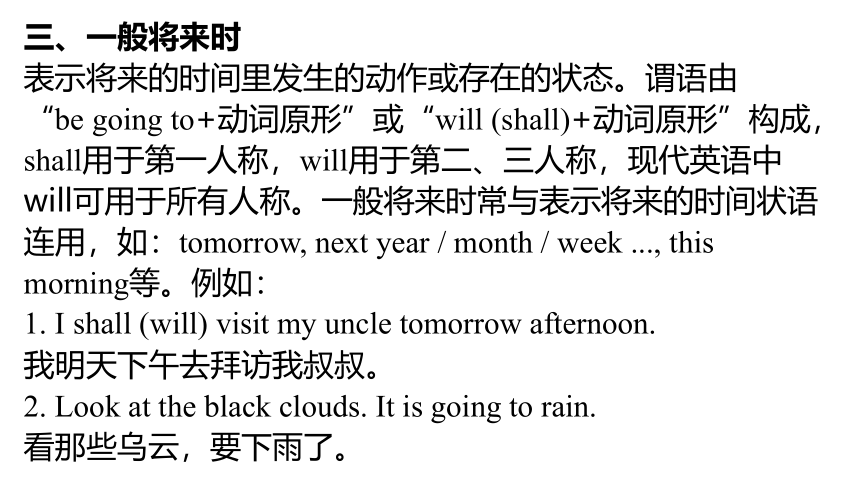
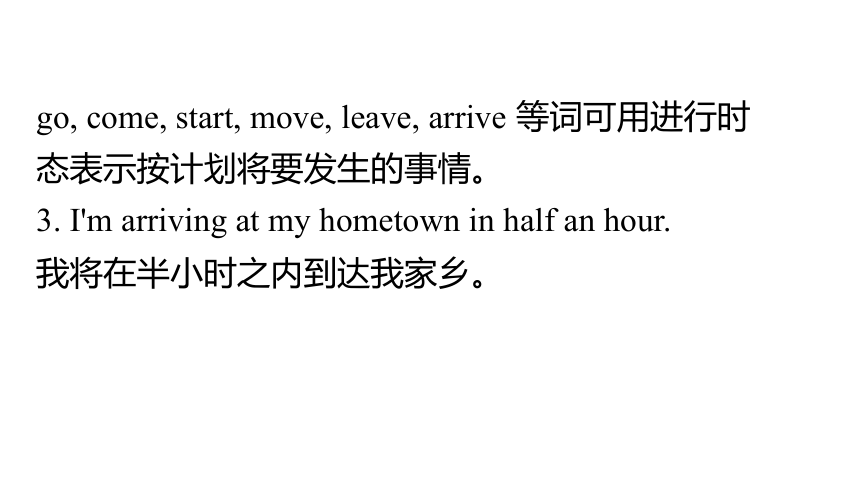
文档简介
(共22张PPT)
M1 Wonders of the world
Unit 3 Language in use
Read aloud
1). I visited the Giant’s Causeway two years ago.
2). It produces electricity for millions of people in China.
3). I’ve never seen it, so I’m not sure I agree with you.
5). You’ll get there in five minutes.
4). I looked into the east - the sky was becoming grey.
6). Am I going the right way
时态是谓语动词通过自身的变化来表示动作发生的时间和所处状态的各种形式。也就是说时态是通过句子谓语动词的某种形式来体现的。今天我们复习六种:一般现在时,一般过去时,一般将来时,现在进行时,过去进行时,现在完成时。
一、一般现在时
表示主语的性格、能力、特征,以及经常性、习惯性的行为。主语是第三人称单数时,行为动词词尾加-s或-es, 其余人称用动词原形。连系动词be有am, is, are三种形式。have的第三人称单数形式是has。一般现在时常与always, sometimes, once a week, every day,on Sundays等时间状语连用。例如:
1. She goes to school by bus evey day.
她每天坐车去学校。
2. My mother always gets up very early every day.
我妈妈每天总是起床很早。
由when, until, as soon as引导的时间状语从句和由if, unless 引导的条件状语从句,要用一般现在时表将来。例如:
1. I’ll ring you up as soon as I get to Beijing.
我一到北京就给你打电话。
2. I’m going to see you if it doesn’t rain tomorrow.
如果明天不下雨,我就去看你。
二、一般过去时
表示过去的行为或状态,也可以表示过去经常性的行为或状态,谓语动词用过去式。动词be的过去式有was(第一、三人称单数)和were (其余人称)两种形式;动词have的过去式是had。一般过去时常与表示过去的时间状语连用,如:yesterday, last night (year / month, week ...), ... ago, in 2008等。例如:
1. He worked in this city in 2000.
2000年他在这个城市工作。
2. Mother bought a nice handbag last Sunday.
上星期天妈妈买了个好看的手提包。
三、一般将来时
表示将来的时间里发生的动作或存在的状态。谓语由
“be going to+动词原形”或“will (shall)+动词原形”构成,shall用于第一人称,will用于第二、三人称,现代英语中will可用于所有人称。一般将来时常与表示将来的时间状语连用,如:tomorrow, next year / month / week ..., this morning等。例如:
1. I shall (will) visit my uncle tomorrow afternoon.
我明天下午去拜访我叔叔。
2. Look at the black clouds. It is going to rain.
看那些乌云,要下雨了。
go, come, start, move, leave, arrive 等词可用进行时 态表示按计划将要发生的事情。
3. I'm arriving at my hometown in half an hour.
我将在半小时之内到达我家乡。
四、现在进行时
表示说话时或现阶段正在进行的动作或发生的事情。谓语由“be (am / is / are) + V-ing形式”构成。现在进行时常与now, these days等时间状语或提示词look, listen等连用。例如:
1. What are you doing now
现在你在做什么
2. Listen!Someone is singing in the next room.
听!有人在隔壁唱歌。
表感觉、态度、情感的动词,如:see, hear, feel, want, like, think等没有进行时。
五、过去进行时
表示过去某一时间正在发生的动作或存在的状态,谓语由“was (were) + V-ing形式”构成。常与this time yesterday, at six yesterday, when+从句等特定的过去时间状语连用。例如:
1. I was watching TV this time yesterday.
昨天这个时候我正在看电视。
2. I was shopping when you called me yesterday.
昨天你打电话的时候我正在购物。
六、现在完成时
现在完成时由“have/has + done”构成,使用情况有两种。
动作在说话之前就结束,对现在有影响。句中没有具体的时间状语。
1. He has gone to Fuzhou .
他已经去福州了。
动作始于过去,持续到现在,也许还会持续下去。常与表示一段时间的短语或者so far, now, today, this week/month/ year 等时间状语连用。
2.He has studied English for 5 years.
他学英语有五年了。
3. Now I have finished my work.
现在我已经完成工作了。
注意,非延续动词come, go, die, marry ,buy 等完成时不能与时间段连用。
1. a) I often play basketball.
b) I am playing basketball now.
2. a) She has gone to the Great Wall.
b) She has been to the Great Wall.
3. a) They had an English class yesterday.
b) They were having an English class at nine o’clock
yesterday morning.
a 动作经常发生
b 动作正在进行
a 去了,没回来
b 去过,回来了
a 动作已经发生、过去的动作
b 过去某时刻正在进行的动作
Explain the differences in meaning between sentences a) and b).
1
4. a) He is doing an interview.
b) He has done an interview.
5. a) We are drawing a picture of the Victoria Falls
now.
b) We will draw a picture of the Victoria Falls.
a 现在正在进行的动作
b 到现在为止动作已经结束
a 现在正在进行的动作
b 将要发生的动作
appear, finish, give, rain, talk, visit, walk
1. Listen! It ___________outside.
2. The great musician __________a concert in Guangzhou next month.
3. Last summer, my parents _______the Terracotta Army in Xi’an.
is raining
will give
visited
Complete the sentences with the correct form of the words in the box.
2
4. He _____already ________ a new book about travel.
5.Thousands of people _______along the Great Wall every year.
6. A few minutes later, a stranger __________at the end of the street.
7. The students _____________ about the journey to the Grand Canyon when the teacher came into the classroom.
finished
has
walk
appeared
were talking
The sun was going down when we (1) _______(arrive) at the ground floor of the building. I (2)______(be) afraid of going to the top of tall buildings, so I was a little nervous as we (3) _______(walk) into the lift. The lift (4)_________ (climb) faster and faster until we
arrived
was
walked
climbed
Complete the passage with the correct form of the words in brackets.
3
(5) _______ (reach) the 88th floor. It(6) ____(be) high up there, but I was not afraid when I stood at the top.
The Jin Mao Tower in Shanghai, one of the tallest buildings in the world, (7)____ (be) 420.5 metres high. It was built in 1999, and it (8) _____ (have) a fantastic view of Pudong District and the centre of Shanghai. I really like the tower and I am sure I (9) __________ (visit) it again.
reached
was
is
has
will visit
A: Have you ever visited the Great Wall
B: Yes, I have. / No, I haven’t.
A: When did you visit it / When will you visit it
B: I visited it five years ago. / Maybe I’ll visit it next year.
Work in pairs. Talk about the wonders of the world you have or have not visited.
4
Wonders of the world When did you visit it When will you visit it
The Great Wall
GOOD JOB
M1 Wonders of the world
Unit 3 Language in use
Read aloud
1). I visited the Giant’s Causeway two years ago.
2). It produces electricity for millions of people in China.
3). I’ve never seen it, so I’m not sure I agree with you.
5). You’ll get there in five minutes.
4). I looked into the east - the sky was becoming grey.
6). Am I going the right way
时态是谓语动词通过自身的变化来表示动作发生的时间和所处状态的各种形式。也就是说时态是通过句子谓语动词的某种形式来体现的。今天我们复习六种:一般现在时,一般过去时,一般将来时,现在进行时,过去进行时,现在完成时。
一、一般现在时
表示主语的性格、能力、特征,以及经常性、习惯性的行为。主语是第三人称单数时,行为动词词尾加-s或-es, 其余人称用动词原形。连系动词be有am, is, are三种形式。have的第三人称单数形式是has。一般现在时常与always, sometimes, once a week, every day,on Sundays等时间状语连用。例如:
1. She goes to school by bus evey day.
她每天坐车去学校。
2. My mother always gets up very early every day.
我妈妈每天总是起床很早。
由when, until, as soon as引导的时间状语从句和由if, unless 引导的条件状语从句,要用一般现在时表将来。例如:
1. I’ll ring you up as soon as I get to Beijing.
我一到北京就给你打电话。
2. I’m going to see you if it doesn’t rain tomorrow.
如果明天不下雨,我就去看你。
二、一般过去时
表示过去的行为或状态,也可以表示过去经常性的行为或状态,谓语动词用过去式。动词be的过去式有was(第一、三人称单数)和were (其余人称)两种形式;动词have的过去式是had。一般过去时常与表示过去的时间状语连用,如:yesterday, last night (year / month, week ...), ... ago, in 2008等。例如:
1. He worked in this city in 2000.
2000年他在这个城市工作。
2. Mother bought a nice handbag last Sunday.
上星期天妈妈买了个好看的手提包。
三、一般将来时
表示将来的时间里发生的动作或存在的状态。谓语由
“be going to+动词原形”或“will (shall)+动词原形”构成,shall用于第一人称,will用于第二、三人称,现代英语中will可用于所有人称。一般将来时常与表示将来的时间状语连用,如:tomorrow, next year / month / week ..., this morning等。例如:
1. I shall (will) visit my uncle tomorrow afternoon.
我明天下午去拜访我叔叔。
2. Look at the black clouds. It is going to rain.
看那些乌云,要下雨了。
go, come, start, move, leave, arrive 等词可用进行时 态表示按计划将要发生的事情。
3. I'm arriving at my hometown in half an hour.
我将在半小时之内到达我家乡。
四、现在进行时
表示说话时或现阶段正在进行的动作或发生的事情。谓语由“be (am / is / are) + V-ing形式”构成。现在进行时常与now, these days等时间状语或提示词look, listen等连用。例如:
1. What are you doing now
现在你在做什么
2. Listen!Someone is singing in the next room.
听!有人在隔壁唱歌。
表感觉、态度、情感的动词,如:see, hear, feel, want, like, think等没有进行时。
五、过去进行时
表示过去某一时间正在发生的动作或存在的状态,谓语由“was (were) + V-ing形式”构成。常与this time yesterday, at six yesterday, when+从句等特定的过去时间状语连用。例如:
1. I was watching TV this time yesterday.
昨天这个时候我正在看电视。
2. I was shopping when you called me yesterday.
昨天你打电话的时候我正在购物。
六、现在完成时
现在完成时由“have/has + done”构成,使用情况有两种。
动作在说话之前就结束,对现在有影响。句中没有具体的时间状语。
1. He has gone to Fuzhou .
他已经去福州了。
动作始于过去,持续到现在,也许还会持续下去。常与表示一段时间的短语或者so far, now, today, this week/month/ year 等时间状语连用。
2.He has studied English for 5 years.
他学英语有五年了。
3. Now I have finished my work.
现在我已经完成工作了。
注意,非延续动词come, go, die, marry ,buy 等完成时不能与时间段连用。
1. a) I often play basketball.
b) I am playing basketball now.
2. a) She has gone to the Great Wall.
b) She has been to the Great Wall.
3. a) They had an English class yesterday.
b) They were having an English class at nine o’clock
yesterday morning.
a 动作经常发生
b 动作正在进行
a 去了,没回来
b 去过,回来了
a 动作已经发生、过去的动作
b 过去某时刻正在进行的动作
Explain the differences in meaning between sentences a) and b).
1
4. a) He is doing an interview.
b) He has done an interview.
5. a) We are drawing a picture of the Victoria Falls
now.
b) We will draw a picture of the Victoria Falls.
a 现在正在进行的动作
b 到现在为止动作已经结束
a 现在正在进行的动作
b 将要发生的动作
appear, finish, give, rain, talk, visit, walk
1. Listen! It ___________outside.
2. The great musician __________a concert in Guangzhou next month.
3. Last summer, my parents _______the Terracotta Army in Xi’an.
is raining
will give
visited
Complete the sentences with the correct form of the words in the box.
2
4. He _____already ________ a new book about travel.
5.Thousands of people _______along the Great Wall every year.
6. A few minutes later, a stranger __________at the end of the street.
7. The students _____________ about the journey to the Grand Canyon when the teacher came into the classroom.
finished
has
walk
appeared
were talking
The sun was going down when we (1) _______(arrive) at the ground floor of the building. I (2)______(be) afraid of going to the top of tall buildings, so I was a little nervous as we (3) _______(walk) into the lift. The lift (4)_________ (climb) faster and faster until we
arrived
was
walked
climbed
Complete the passage with the correct form of the words in brackets.
3
(5) _______ (reach) the 88th floor. It(6) ____(be) high up there, but I was not afraid when I stood at the top.
The Jin Mao Tower in Shanghai, one of the tallest buildings in the world, (7)____ (be) 420.5 metres high. It was built in 1999, and it (8) _____ (have) a fantastic view of Pudong District and the centre of Shanghai. I really like the tower and I am sure I (9) __________ (visit) it again.
reached
was
is
has
will visit
A: Have you ever visited the Great Wall
B: Yes, I have. / No, I haven’t.
A: When did you visit it / When will you visit it
B: I visited it five years ago. / Maybe I’ll visit it next year.
Work in pairs. Talk about the wonders of the world you have or have not visited.
4
Wonders of the world When did you visit it When will you visit it
The Great Wall
GOOD JOB
同课章节目录
- Module 1 Wonders of the world
- Unit 1 It's more than 2,000 years old.
- Unit 2 The Grand Canyon was not just big.
- Unit 3 Language in use
- Module 2 Public holidays
- Unit 1 My family always go somewhere interesting a
- Unit 2 We have celebrated the festival since the f
- Unit 3 Language in use
- Module 3 Heroes
- Unit 1 She trained hard,so she became a great play
- Unit 2There were few doctors, so he had to work ve
- Unit 3 Language in use
- Module 4 Home alone
- Unit 1 I can look after myself, although it won’t
- Unit 2 I became so bored with their orders that I
- Unit 3 Language in use
- Module 5 Museums
- Unit 1 Don't cross that rope!
- Unit 2 If you ever go to London, make sure you vis
- Unit 3 Language in use
- Module 6 Problems
- Unit 1 If I start after dinner, I'll finish it be
- Unit 2 If you tell him the truth now, you will sho
- Unit 3 Language in use
- Revision Module A
- Module 7 Great books
- Unit 1 We're still influenced by Confucius's idea
- Unit 2 It is still read and loved.
- Unit 3 Language in use
- Module 8 Sports life
- Unit 1 Daming wasn't chosen for the team last time
- Unit 2 He was invited to competitions around the w
- Unit 3 Language in use
- Module 9 Great inventions
- Unit 1 Will computers be used more than books in t
- Unit 2 Will books be replaced by the Internet?
- Unit 3 Language in use
- Module 10 Australia
- Unit 1 I have some photos that I took in Australia
- Unit 2 The game that they like most is Australian
- Unit 3 Language in use
- Module 11 Photos
- Unit 1 He's the boy who won the photo competition
- Unit 2 The photo which we liked best was taken by
- Unit 3 Language in use
- Module 12 Save our world
- Unit 1 If everyone starts to do something, the wor
- Unit 2 Repeat these three words daily: reduce, reu
- Unit 3 Language in use
- Revision Module B
